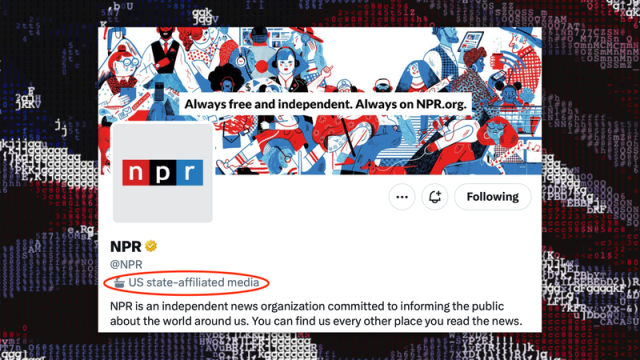
Despite its stated intention, Elon Musk’s Twitter is in fact contributing to misinformation by labelling U.S. outlet National Public Radio as “government-funded media,” one expert says.
The controversial move, which on Wednesday prompted the U.S. radio network to say it would discontinue its Twitter presence, should serve as a warning to other news media around the world — including the CBC, said Merlyna Lim, the Canada Research Chair in Digital Media and Global Network Society at Carleton University.
NPR announced it was quitting Musk’s social-media platform shortly after it found its accounts designated “U.S. state-affiliated media,” which then was changed to “government-funded media.”
“The platform is taking actions that undermine our credibility by falsely implying that we are not editorially independent,” an NPR spokesperson said Wednesday in a statement. “We are not putting our journalism on platforms that have demonstrated an interest in undermining our credibility.”
Musk has maintained his position.
“NPR literally said ‘Federal funding is essential to public radio’ on their own website (now taken down). What hypocrites!” wrote Musk in a Twitter thread on Wednesday.
“Guess they won’t mind losing Federal funding in that case … Defund NPR!”
A day earlier, Canadian Conservative Leader Pierre Poilievre asked Twitter in a letter to label CBC accounts as “government-funded” media.
“We must protect Canadians against disinformation and manipulation by state media. That is why I’m asking Twitter and Elon Musk to accurately label CBC as ‘government-funded media,’” Poilievre tweeted on Tuesday.
Lim said that “calling CBC ‘a government funded media,’ per Poilievre’s call, is an attempt to discredit CBC, and deepen the distrust — as it implies that CBC is an extension or even a mouthpiece of the Liberal government.”
Twitter also designated BBC as “government-funded media” but changed that to “publicly funded” after the U.K. public broadcaster’s objection.
For the moment, though, it’s still status quo in Canada. “As there has been no change to our accounts on Twitter, we continue to use that platform,” said Leon Mar, CBC director of media relations.
Twitter’s policy defines government-funded media as outlets where the government provides some or all of the outlet’s funding and may have varying degrees of government involvement over editorial content. “Which is clearly not the case with CBC/Radio-Canada,” Mar said, arguing that the public broadcaster’s “editorial independence is protected in law in the Broadcasting Act.”
The BBC’s defenders pointed to its funding coming from a tax on televisions paid directly by viewers, not from government coffers. NPR has said that the U.S. federal government provides less than one per cent of its annual operating budget; PBS, which was also labelled as “government-funded media” and joined NPR in leaving Twitter, states that Washington provides 15 per cent of its funds.
By comparison, in its most recent annual report, the CBC’s equivalent number was about 66 per cent — $1.24 billion from Ottawa, and $651 million from elsewhere.
The CBC did not give the Star any indication of whether it will continue to use Twitter if the company labels its accounts as “government-funded” in the future.
“We can’t comment on the motives behind (Poilievre’s) letter,” said Mar in an email, responding to the Star’s question about CBC’s reaction to the conservative leader’s letter.
Despite the fact that CBC accounts remain unlabelled by Twitter, some experts say that the public broadcaster remains vulnerable to criticism and loss of credibility in the changing media landscape.
“CBC’s position is fragile,” said Lim, adding that the public broadcaster “does fairly well” in a 2021 survey looking into public trust in Canada.
Lim said Twitter’s mislabelling of NPR and BBC is misinformation of the sort that “can have a dire consequence for public’s perception of journalistic media” and can lead to shift in consumption toward “the so-called ‘alternative media,’ which are largely opinion-based.
“This also contributes to the deepening polarization within the society.”
Jeffrey Dvorkin, a senior fellow at the University of Toronto and a former managing editor at the CBC and vice-president and ombudsman at NPR, said as a Crown corporation, CBC is vulnerable to pressure from its critics. But “in my experience, there has never been any direct pressure from any government about CBC News reporting. Complaints, sometimes. Direct orders? No.”
Greg Elmer, professor of professional communication at Toronto Metropolitan University, said there are obvious and less obvious consequences of the kind of labelling Twitter is now doing: “Could such labels warn users, for example, that ‘state-affiliated media’ should not be trusted?” Algorithms might also use such labels to downgrade such accounts, he added.
Two days before NPR left Twitter, the outlet’s technology reporter Bobby Allyn tweeted that when he asked Musk how Twitter determines which publication gets a controversial label, Musk told him the platform is using a Wikipedia page listing publicly funded outlets.
“When I pointed out that NPR’s government support does not effect the network’s editorial decisions, (Elon) told me: ‘If you really think that the government has no influence on the entity they’re funding then you’ve been marinating in the Kool-Aid for too long,’” wrote Allyn.
SOURCE: THE STAR